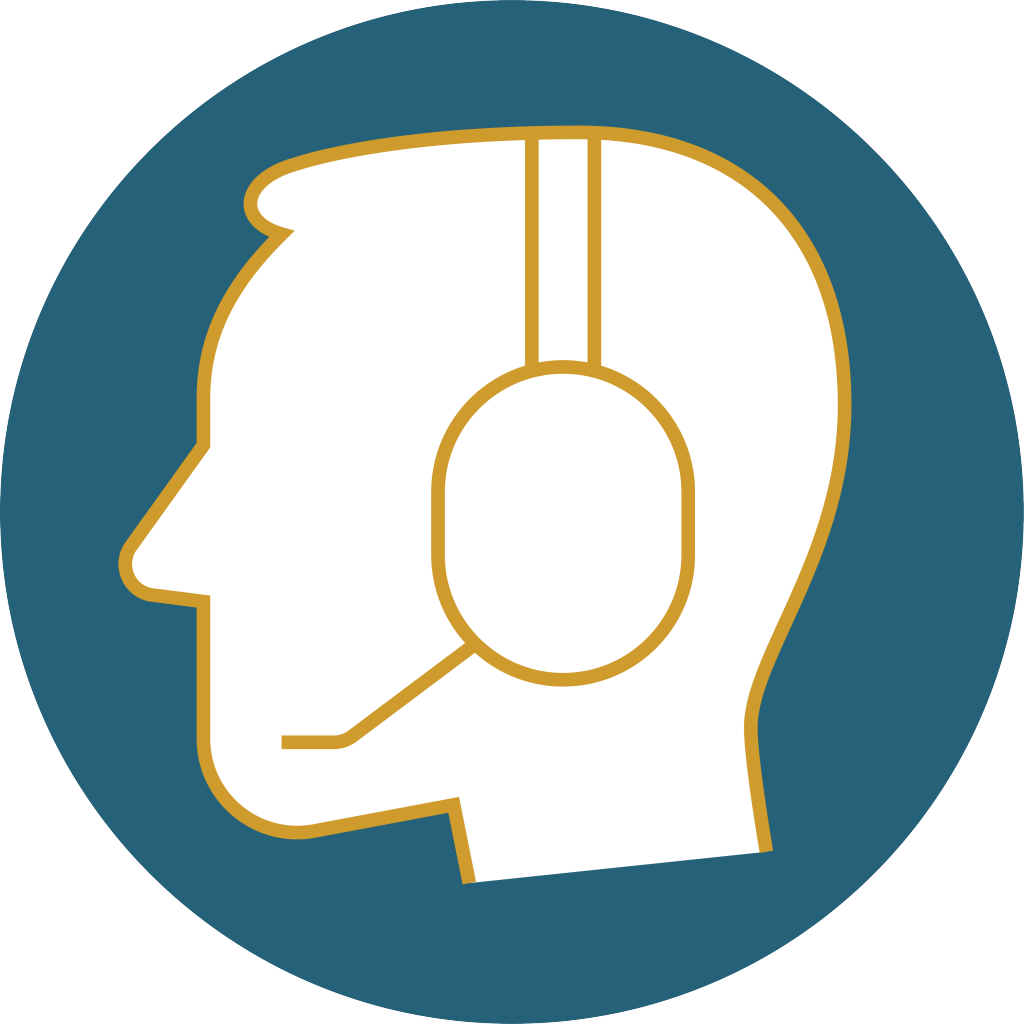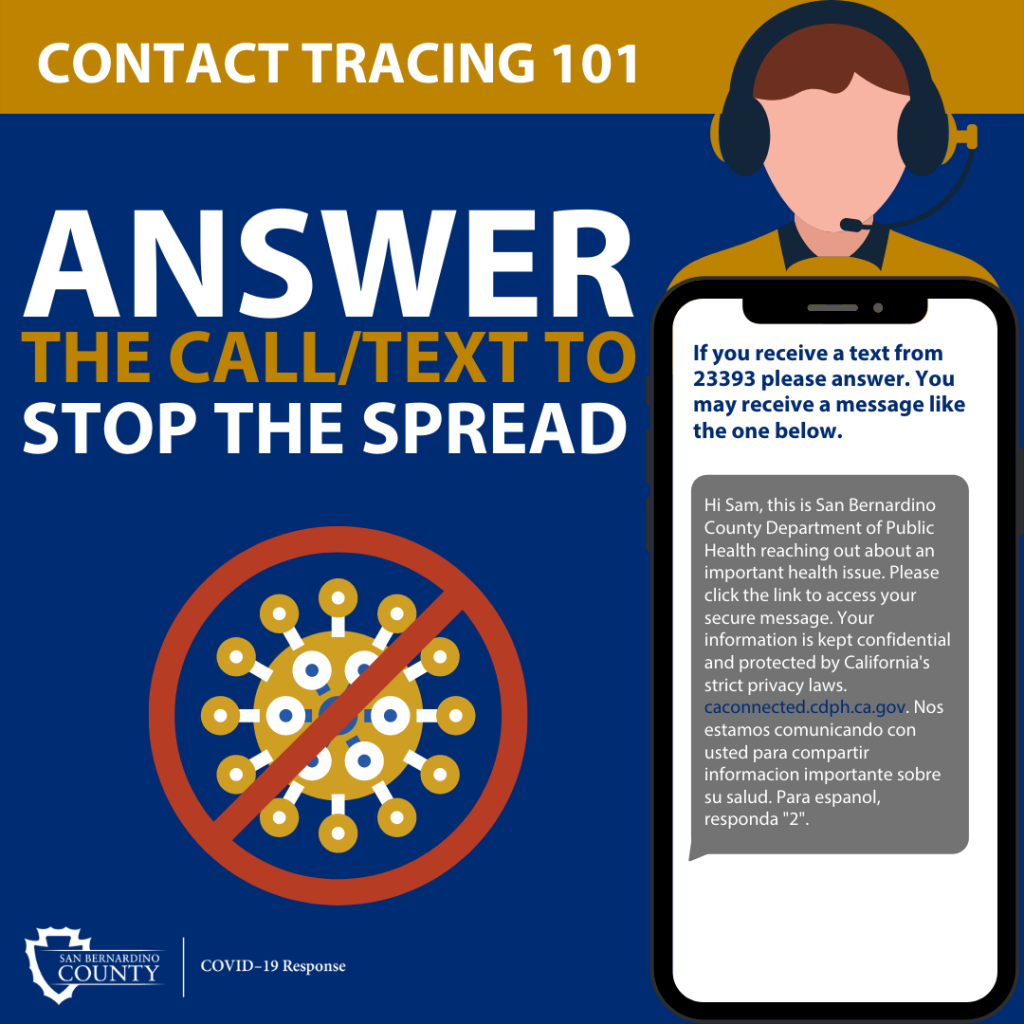Contact Tracing
Contact tracing is key to slowing the spread of COVID-19 and helps protect you, your family and your community.
Contact tracers will ask questions to help understand your illness, where you have been in the past week and who you may have been in close contact with. They will explain the difference between isolation and quarantine and assist you with informing your school or employer if requested. Contact tracers will also explain available resources and provide clear and accurate information that will help keep you and your family safe.
Contact Tracing 101
Working together we can slow the spread of disease.
Please answer when we call or text. How do you know the call is from San Bernardino County? You’ll receive a text from 23393. Watch this short video and the ones below for more information.
- “Answer the Call” COVID-19 Contact Tracing Video
- Responda la llamada, video sobre el rastreo de contactos
You can trust a contact tracer. Privacy and confidentiality are protected.
All contact tracers sign a confidentiality agreement and receive extensive training on Privacy and Confidentiality of Protected Health Information (PHI) and Personal Identifiable Information (PII). Any information gathered during the interview will only be shared with public health officials involved with your care and cannot be shared with law enforcement, immigration or for business purposes.
Self-Quarantine Instructions for Individuals Exposed to COVID-19
FAQs
Contact tracing has been used for decades by state and local health departments to slow or stop the spread of infectious diseases.
Contact tracing slows the spread of COVID-19 by:
- Letting people know they may have been exposed to COVID-19 and should monitor their health for signs and symptoms of COVID-19
- Helping people who may have been exposed to COVID-19 get tested
- Asking people to self-isolate if they have COVID-19 or self-quarantine if they are a close contact of someone with COVID-19
- Connecting individuals to appropriate support and medical services
During contact tracing, the health department staff will not ask you for:
- Money
- Social Security number
- Bank account information
- Salary information
- Credit card numbers
- Your legal status
If you tested positive for COVID-19 or were within 6 feet of someone for at least 15 minutes you may be contacted. Respond immediately to protect the ones you love.
Click here to find out how you can manage confirmed or suspected COVID-19 exposure.
Contact tracers will:
- Ask you to verify your name, date of birth and address.
- Ask if you have received your COVID-19 test results and if you understand what the results mean.
- Ask you to tell them about your symptoms.
- Ask if you have been vaccinated.
- Ask about your employer.
- Ask about your school associations.
- Ask about travel.
- Ask about who you may have been in contact with and if you are aware of anyone you recently spent time who is also ill.
- Ask about any other health related information.
- Ask about your race, ethnicity, and gender.
- Provide you an opprotunity to ask any questions.
- Offer support to help you get tested or vaccinated and give you information on when to get medical care, if needed.
- Notify you that you have been exposed to someone with COVID-19 and discuss possible next steps.
- Offer you supplies, resources or other help that you might need so you are able to quarantine or self-isolate.
A “breakthrough case” of COVID-19 is when a fully vaccinated person later gets the COVID-19 disease they were vaccinated for. There have been reports of COVID-19 breakthrough cases in San Bernardino County and throughout the U.S., and this is not unexpected. It is important to still have best practices when unable to do social distancing: wear a mask, wash with soap and water or apply hand sanitizer for hands.
Recovery is the process of collecting data regarding how our community is healing. Contact tracers working for San Bernardino County may reach out to community members who were ill months ago to ask about persistent symptoms (some people experience “long haulers” symptoms) and provide resources for those people still trying to heal from their COVID illness.
The Pfizer, Moderna and Johnson and Johnson vaccines do not provide 100 percent protection against infection, therefore breakthrough cases may occur the same as several other diseases that vaccines are used for.
When you receive the call from us, please let us know how you feel. We care.
Discussions with health department staff are confidential. This means that your personal and medical information will be kept private and only shared with those who may need to know, like your health care provider.
If you have been diagnosed with COVID-19, your name will not be shared with those you came in contact with. We will only notify people you were in close contact with that they might have been exposed to COVID-19.
For COVID-19, a close contact is anyone who was within 6 feet of an infected person for a total of 15 minutes or more over a 24-hour period (for example, three individual 5-minute exposures for a total of 15 minutes).
An infected person can spread COVID-19 starting from 2 days before they have any symptoms (or, if they are asymptomatic, 2 days before their specimen that tested positive was collected), until they meet the criteria for discontinuing home isolation.
If you have COVID-19, tell your close contacts you have COVID-19 so that they can quarantine at home and get tested. By letting your close contacts know they may have been exposed to COVID-19, you are helping to protect them and others within your community.
You can call, text or email your contacts. If you would like to stay anonymous, there is also an online tool that allows you to tell your contacts by sending out emails or text notifications anonymously.
A person is still considered a close contact even if one or both people wore a mask when they were together.
If you have been in close contact with someone who has COVID-19, you should be tested, even if you do not have symptoms of COVID-19. You can find a testing location in San Bernardino County near you at SBCOVID19.com/testing.
For more information, see COVID-19 Contact Tracing.
Watch for or monitor your symptoms of COVID-19. If your symptoms worsen or become severe, you should seek medical care.

